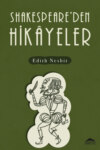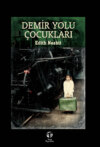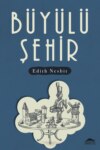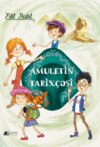Kitabı oku: «The Magic World», sayfa 4
‘I’m not quite sure, but I think it’s the altar stone of Stonehenge.’
‘It is proved,’ said Blue Mantle. ‘Thou art the Chosen of the Gods. Is there anything my Lord needs?’ he added humbly.
‘I … I’m rather hungry,’ said Quentin; ‘it’s a long time since dinner, you know.’
They brought him bread and bananas, and oranges.
‘Take,’ said Blue Mantle, ‘of the fruits of the earth, and specially of this, which gives drink and meat and ointment to man,’ suddenly offering a large cocoa-nut.
Quentin took, with appropriate ‘Thank you’s’ and ‘You’re very kind’s.’
‘Nothing,’ said Blue Mantle, ‘is too good for the Chosen of the Gods. All that we have is yours, to the very last day of your life you have only to command, and we obey. You will like to eat in seclusion. And afterwards you will let us behold the whole person of the Chosen of the Gods.’
Quentin retired into the purple tent, with the fruits and the cocoa-nut. As you know, a cocoa-nut is not handy to get at the inside of, at the best of times, so Quentin set that aside, meaning to ask Blue Mantle later on for a gimlet and a hammer.
When he had had enough to eat he peeped out again. Blue Mantle was on the watch and came quickly forward.
‘Now,’ said he, very crossly indeed, ‘tell me how you got here. This Chosen of the Gods business is all very well for the vulgar. But you and I know that there is no such thing as magic.’
‘Speak for yourself,’ said Quentin. ‘If I’m not here by magic I’m not here at all.’
‘Yes, you are,’ said Blue Mantle.
‘I know I am,’ said Quentin, ‘but if I’m not here by magic what am I here by?’
‘Stowawayishness,’ said Blue Mantle.
‘If you think that why don’t you treat me as a stowaway?’
‘Because of public opinion,’ said Blue Mantle, rubbing his nose in an angry sort of perplexedness.
‘Very well,’ said Quentin, who was feeling so surprised and bewildered that it was a real relief to him to bully somebody. ‘Now look here. I came here by magic, accidental magic. I belong to quite a different world from yours. But perhaps you are right about my being the Chosen of the Gods. And I sha’n’t tell you anything about my world. But I command you, by the Sacred Tau’ (he had been quick enough to catch and remember the word), ‘to tell me who you are, and where you come from, and where you are going.’
Blue Mantle shrugged his shoulders. ‘Oh, well,’ he said, ‘if you invoke the sacred names of Power… But I don’t call it fair play. Especially as you know perfectly well, and just want to browbeat me into telling lies. I shall not tell lies. I shall tell you the truth.’
‘I hoped you would,’ said Quentin gently.
‘Well then,’ said Blue Mantle, ‘I am a Priest of Poseidon, and I come from the great and immortal kingdom of Atlantis.’
‘From the temple where the gold statue is, with the twelve sea-horses in gold?’ Quentin asked eagerly.
‘Ah, I knew you knew all about it,’ said Blue Mantle, ‘so I don’t need to tell you that I am taking the sacred stone, on which you are sitting (profanely if you are a mere stowaway, and not the Chosen of the Gods) to complete the splendid structure of a temple built on a great plain in the second of the islands which are our colonies in the North East.’
‘Tell me all about Atlantis,’ said Quentin. And the priest, protesting that Quentin knew as much about it as he did, told.
And all the time the ship was ploughing through the waves, sometimes sailing, sometimes rowed by hidden rowers with long oars. And Quentin was served in all things as though he had been a king. If he had insisted that he was not the Chosen of the Gods everything might have been different. But he did not. And he was very anxious to show how much he knew about Atlantis. And sometimes he was wrong, the Priest said, but much more often he was right.
‘We are less than three days’ journey now from the Eastern Isles,’ Blue Mantle said one day, ‘and I warn you that if you are a mere stowaway you had better own it. Because if you persist in calling yourself the Chosen of the Gods you will be expected to act as such – to the very end.’
‘I don’t call myself anything,’ said Quentin, ‘though I am not a stowaway, anyhow, and I don’t know how I came here – so of course it was magic. It’s simply silly your being so cross. I can’t help being here. Let’s be friends.’
‘Well,’ said Blue Mantle, much less crossly, ‘I never believed in magic, though I am a priest, but if it is, it is. We may as well be friends, as you call it. It isn’t for very long, anyway,’ he added mysteriously.
And then to show his friendliness he took Quentin all over the ship, and explained it all to him. And Quentin enjoyed himself thoroughly, though every now and then he had to pinch himself to make sure that he was awake. And he was fed well all the time, and all the time made much of, so that when the ship reached land he was quite sorry. The ship anchored by a stone quay, most solid and serviceable, and every one was very busy.
Quentin kept out of sight behind the purple curtains. The sailors and the priests and the priests’ attendants and everybody on the boat had asked him so many questions, and been so curious about his clothes, that he was not anxious to hear any more questions asked, or to have to invent answers to them.
And after a very great deal of talk – almost as much as Mr. Miles’s carrying had needed – the altar stone was lifted, Quentin, curtains, awning and all, and carried along a gangway to the shore, and there it was put on a sort of cart, more like what people in Manchester call a lurry than anything else I can think of. The wheels were made of solid circles of wood bound round with copper. And the cart was drawn by – not horses or donkeys or oxen or even dogs – but by an enormous creature more like an elephant than anything else, only it had long hair rather like the hair worn by goats.
You, perhaps, would not have known what this vast creature was, but Quentin, who had all sorts of out-of-the-way information packed in his head, knew at once that it was a mammoth.
And by that he knew, too, that he had slipped back many thousands of years, because, of course, it is a very long time indeed since there were any mammoths alive, and able to draw lurries. And the car and the priest and the priest’s retinue and the stone and Quentin and the mammoth journeyed slowly away from the coast, passing through great green forests and among strange gray mountains.
Where were they journeying?
Quentin asked the same question you may be sure, and Blue Mantle told him —
‘To Stonehenge.’ And Quentin understood him perfectly, though Stonehenge was not the word Blue Mantle used, or anything like it.
‘The great temple is now complete,’ he said, ‘all but the altar stone. It will be the most wonderful temple ever built in any of the colonies of Atlantis. And it will be consecrated on the longest day of the year.’
‘Midsummer Day,’ said Quentin thoughtlessly – and, as usual, anxious to tell all he knew. ‘I know. The sun strikes through the arch on to the altar stone at sunrise. Hundreds of people go to see it: the ruins are quite crowded sometimes, I believe.’
‘Ruins?’ said the priest in a terrible voice. ‘Crowded? Ruins?’
‘I mean,’ said Quentin hastily, ‘the sun will still shine the same way even when the temple is in ruins, won’t it?’
‘The temple,’ said the priest, ‘is built to defy time. It will never be in ruins.’
‘That’s all you know,’ said Quentin, not very politely.
‘It is not by any means all I know,’ said the priest. ‘I do not tell all I know. Nor do you.’
‘I used to,’ said Quentin, ‘but I sha’n’t any more. It only leads to trouble – I see that now.’
Now, though Quentin had been intensely interested in everything he had seen in the ship and on the journey, you may be sure he had not lost sight of the need there was to get back out of this time of Atlantis into his own time. He knew that he must have got into these Atlantean times by some very simple accidental magic, and he felt no doubt that he should get back in the same way. He felt almost sure that the reverse-action, so to speak, of the magic would begin when the stone got back to the place where it had lain for so many thousand years before he happened to go to sleep on it, and to start – perhaps by the St. John’s wort – the accidental magic. If only, when he got back there he could think of the compelling, the magic word!
And now the slow procession wound over the downs, and far away across the plain, which was almost just the same then as it is now, Quentin saw what he knew must be Stonehenge. But it was no longer the grey pile of ruins that you have perhaps seen – or have, at any rate, seen pictures of.
From afar one could see the gleam of yellow gold and red copper; the flutter of purple curtains, the glitter and dazzle of shimmering silver.
As they drew near to the spot Quentin perceived that the great stones he remembered were overlaid with ornamental work, with vivid, bright-coloured paintings. The whole thing was a great circular building, every stone in its place. At a mile or two distant lay a town. And in that town, with every possible luxury, served with every circumstance of servile homage, Quentin ate and slept.
I wish I had time to tell you what that town was like where he slept and ate, but I have not. You can read for yourself, some day, what Atlantis was like. Plato tells us a good deal, and the Colonies of Atlantis must have had at least a reasonable second-rate copy of the cities of that fair and lovely land.
That night, for the first time since he had first gone to sleep on the altar stone, Quentin slept apart from it. He lay on a wooden couch strewn with soft bear-skins, and a woollen coverlet was laid over him. And he slept soundly.
In the middle of the night, as it seemed, Blue Mantle woke him.
‘Come,’ he said, ‘Chosen of the Gods – since you will be that, and no stowaway – the hour draws nigh.’
The mammoth was waiting. Quentin and Blue Mantle rode on its back to the outer porch of the new temple of Stonehenge. Rows of priests and attendants, robed in white and blue and purple, formed a sort of avenue up which Blue Mantle led the Chosen of the Gods, who was Quentin. They took off his jacket and put a white dress on him, rather like a night-shirt without sleeves. And they put a thick wreath of London Pride on his head and another, larger and longer, round his neck.
‘If only the chaps at school could see me now!’ he said to himself proudly.
And by this time it was gray dawn.
‘Lie down now,’ said Blue Mantle, ‘lie down, O Beloved of the Gods, upon the altar stone, for the last time.’
‘I shall be able to go, then?’ Quentin asked. This accidental magic was, he perceived, a tricky thing, and he wanted to be sure.
‘You will not be able to stay,’ said the priest. ‘If going is what you desire, the desire of the Chosen of the Gods is fully granted.’
The grass on the plain far and near rustled with the tread of many feet; the cold air of dawn thrilled to the awed murmured of many voices.
Quentin lay down, with his pink wreaths and his white robe, and watched the quickening pinkiness of the East. And slowly the great circle of the temple filled with white-robed folk, all carrying in their hands the faint pinkiness of the flowers which we nowadays call London Pride.
And all eyes were fixed on the arch through which, at sunrise on Midsummer Day, the sun’s first beam should fall upon the white, new, clean altar stone. The stone is still there, after all these thousands of years, and at sunrise on Midsummer Day the sun’s first ray still falls on it.
The sky grew lighter and lighter, and at last the sun peered redly over the down, and the first ray of the morning sunlight fell full on the altar stone and on the face of Quentin.
And, as it did so, a very tall, white-robed priest with a deer-skin apron and a curious winged head-dress stepped forward. He carried a great bronze knife, and he waved it ten times in the shaft of sunlight that shot through the arch and on to the altar stone.
‘Thus,’ he cried, ‘thus do I bathe the sacred blade in the pure fountain of all light, all wisdom, all splendour. In the name of the ten kings, the ten virtues, the ten hopes, the ten fears I make my weapon clean! May this temple of our love and our desire endure for ever, so long as the glory of our Lord the Sun is shed upon this earth. May the sacrifice I now humbly and proudly offer be acceptable to the gods by whom it has been so miraculously provided. Chosen of the Gods! return to the gods who sent thee!’
A roar of voices rang through the temple. The bronze knife was raised over Quentin. He could not believe that this, this horror, was the end of all these wonderful happenings.
‘No – no,’ he cried, ‘it’s not true. I’m not the Chosen of the Gods! I’m only a little boy that’s got here by accidental magic!’
‘Silence,’ cried the priest, ‘Chosen of the Immortals, close your eyes! It will not hurt. This life is only a dream; the other life is the real life. Be strong, be brave!’
Quentin was not brave. But he shut his eyes. He could not help it. The glitter of the bronze knife in the sunlight was too strong for him.
He could not believe that this could really have happened to him. Every one had been so kind – so friendly to him. And it was all for this!
Suddenly a sharp touch at his side told him that for this, indeed, it had all been. He felt the point of the knife.
‘Mother!’ he cried. And opened his eyes again.
He always felt quite sure afterwards that ‘Mother’ was the master-word, the spell of spells. For when he opened his eyes there was no priest, no white-robed worshippers, no splendour of colour and metal, no Chosen of the Gods, no knife – only a little boy with a piece of sacking over him, damp with the night dews, lying on a stone amid the grey ruins of Stonehenge, and, all about him, a crowd of tourists who had come to see the sun’s first shaft strike the age-old altar of Stonehenge on Midsummer Day in the morning. And instead of a knife point at his side there was only the ferrule of the umbrella of an elderly and retired tea merchant in a mackintosh and an Alpine hat, – a ferrule which had prodded the sleeping boy so unexpectedly surprised on the very altar stone where the sun’s ray now lingered.
And then, in a moment, he knew that he had not uttered the spell in vain, the word of compelling, the word of power: for his mother was there kneeling beside him. I am sorry to say that he cried as he clung to her. We cannot all of us be brave, always.
The tourists were very kind and interested, and the tea merchant insisted on giving Quentin something out of a flask, which was so nasty that Quentin only pretended to drink, out of politeness. His mother had a carriage waiting, and they escaped to it while the tourists were saying, ‘How romantic!’ and asking each other whatever in the world had happened.
* * * * *
‘But how did you come to be there, darling?’ said his mother with warm hands comfortingly round him. ‘I’ve been looking for you all night. I went to say good-bye to you yesterday – Oh, Quentin – and I found you’d run away. How could you?’
‘I’m sorry,’ said Quentin, ‘if it worried you, I’m sorry. Very, very. I was going to telegraph to-day.’
‘But where have you been? What have you been doing all night?’ she asked, caressing him.
‘Is it only one night?’ said Quentin. ‘I don’t know exactly what’s happened. It was accidental magic, I think, mother. I’m glad I thought of the right word to get back, though.’ And then he told her all about it. She held him very tightly and let him talk.
Perhaps she thought that a little boy to whom accidental magic happened all in a minute, like that, was not exactly the right little boy for that excellent school in Salisbury. Anyhow she took him to Egypt with her to meet his father, and, on the way, they happened to see a doctor in London who said: ‘Nerves’ which is a poor name for accidental magic, and Quentin does not believe it means the same thing at all.
Quentin’s father is well now, and he has left the army, and father and mother and Quentin live in a jolly, little, old house in Salisbury, and Quentin is a ‘day boy’ at that very same school. He and Smithson minor are the greatest of friends. But he has never told Smithson minor about the accidental magic. He has learned now, and learned very thoroughly, that it is not always wise to tell all you know. If he had not owned that he knew that it was the Stonehenge altar stone!
* * * * *
You may think that the accidental magic was all a dream, and that Quentin dreamed it because his mother had told him so much about Atlantis. But then, how do you account for his dreaming so much that his mother had never told him? You think that that part wasn’t true, well, it may have been true for anything I know. And I am sure you don’t know more about it than I do.
IV
THE PRINCESS AND THE HEDGE-PIG
‘But I don’t see what we’re to do’ said the Queen for the twentieth time.
‘Whatever we do will end in misfortune,’ said the King gloomily; ‘you’ll see it will.’
They were sitting in the honeysuckle arbour talking things over, while the nurse walked up and down the terrace with the new baby in her arms.
‘Yes, dear,’ said the poor Queen; ‘I’ve not the slightest doubt I shall.’
Misfortune comes in many ways, and you can’t always know beforehand that a certain way is the way misfortune will come by: but there are things misfortune comes after as surely as night comes after day. For instance, if you let all the water boil away, the kettle will have a hole burnt in it. If you leave the bath taps running and the waste-pipe closed, the stairs of your house will, sooner or later, resemble Niagara. If you leave your purse at home, you won’t have it with you when you want to pay your tram-fare. And if you throw lighted wax matches at your muslin curtains, your parent will most likely have to pay five pounds to the fire engines for coming round and blowing the fire out with a wet hose. Also if you are a king and do not invite the wicked fairy to your christening parties, she will come all the same. And if you do ask the wicked fairy, she will come, and in either case it will be the worse for the new princess. So what is a poor monarch to do? Of course there is one way out of the difficulty, and that is not to have a christening party at all. But this offends all the good fairies, and then where are you?
All these reflections had presented themselves to the minds of King Ozymandias and his Queen, and neither of them could deny that they were in a most awkward situation. They were ‘talking it over’ for the hundredth time on the palace terrace where the pomegranates and oleanders grew in green tubs and the marble balustrade is overgrown with roses, red and white and pink and yellow. On the lower terrace the royal nurse was walking up and down with the baby princess that all the fuss was about. The Queen’s eyes followed the baby admiringly.
‘The darling!’ she said. ‘Oh, Ozymandias, don’t you sometimes wish we’d been poor people?’
‘Never!’ said the King decidedly.
‘Well, I do,’ said the Queen; ‘then we could have had just you and me and your sister at the christening, and no fear of – oh! I’ve thought of something.’
The King’s patient expression showed that he did not think it likely that she would have thought of anything useful; but at the first five words his expression changed. You would have said that he pricked up his ears, if kings had ears that could be pricked up. What she said was —
‘Let’s have a secret christening.’
‘How?’ asked the King.
The Queen was gazing in the direction of the baby with what is called a ‘far away look’ in her eyes.
‘Wait a minute,’ she said slowly. ‘I see it all – yes – we’ll have the party in the cellars – you know they’re splendid.’
‘My great-grandfather had them built by Lancashire men, yes,’ interrupted the King.
‘We’ll send out the invitations to look like bills. The baker’s boy can take them. He’s a very nice boy. He made baby laugh yesterday when I was explaining to him about the Standard Bread. We’ll just put “1 loaf 3. A remittance at your earliest convenience will oblige.” That’ll mean that 1 person is invited for 3 o’clock, and on the back we’ll write where and why in invisible ink. Lemon juice, you know. And the baker’s boy shall be told to ask to see the people – just as they do when they really mean earliest convenience – and then he shall just whisper: “Deadly secret. Lemon juice. Hold it to the fire,” and come away. Oh, dearest, do say you approve!’
The King laid down his pipe, set his crown straight, and kissed the Queen with great and serious earnestness.
‘You are a wonder,’ he said. ‘It is the very thing. But the baker’s boy is very small. Can we trust him?’
‘He is nine,’ said the Queen, ‘and I have sometimes thought that he must be a prince in disguise. He is so very intelligent.’
The Queen’s plan was carried out. The cellars, which were really extraordinarily fine, were secretly decorated by the King’s confidential man and the Queen’s confidential maid and a few of their confidential friends whom they knew they could really trust. You would never have thought they were cellars when the decorations were finished. The walls were hung with white satin and white velvet, with wreaths of white roses, and the stone floors were covered with freshly cut turf with white daisies, brisk and neat, growing in it.
The invitations were duly delivered by the baker’s boy. On them was written in plain blue ink,
‘The Royal Bakeries
1 loaf 3d
An early remittance will oblige.’
And when the people held the letter to the fire, as they were whisperingly instructed to do by the baker’s boy, they read in a faint brown writing: —
‘King Ozymandias and Queen Eliza invite you to the christening of their daughter Princess Ozyliza at three on Wednesday in the Palace cellars.
‘P.S.– We are obliged to be very secret and careful because of wicked fairies, so please come disguised as a tradesman with a bill, calling for the last time before it leaves your hands.’
You will understand by this that the King and Queen were not as well off as they could wish; so that tradesmen calling at the palace with that sort of message was the last thing likely to excite remark. But as most of the King’s subjects were not very well off either, this was merely a bond between the King and his people. They could sympathise with each other, and understand each other’s troubles in a way impossible to most kings and most nations.
You can imagine the excitement in the families of the people who were invited to the christening party, and the interest they felt in their costumes. The Lord Chief Justice disguised himself as a shoemaker; he still had his old blue brief-bag by him, and a brief-bag and a boot-bag are very much alike. The Commander-in-Chief dressed as a dog’s meat man and wheeled a barrow. The Prime Minister appeared as a tailor; this required no change of dress and only a slight change of expression. And the other courtiers all disguised themselves perfectly. So did the good fairies, who had, of course, been invited first of all. Benevola, Queen of the Good Fairies, disguised herself as a moonbeam, which can go into any palace and no questions asked. Serena, the next in command, dressed as a butterfly, and all the other fairies had disguises equally pretty and tasteful.
The Queen looked most kind and beautiful, the King very handsome and manly, and all the guests agreed that the new princess was the most beautiful baby they had ever seen in all their born days.
Everybody brought the most charming christening presents concealed beneath their disguises. The fairies gave the usual gifts, beauty, grace, intelligence, charm, and so on.
Everything seemed to be going better than well. But of course you know it wasn’t. The Lord High Admiral had not been able to get a cook’s dress large enough completely to cover his uniform; a bit of an epaulette had peeped out, and the wicked fairy, Malevola, had spotted it as he went past her to the palace back door, near which she had been sitting disguised as a dog without a collar hiding from the police, and enjoying what she took to be the trouble the royal household were having with their tradesmen.
Malevola almost jumped out of her dog-skin when she saw the glitter of that epaulette.
‘Hullo?’ she said, and sniffed quite like a dog. ‘I must look into this,’ said she, and disguising herself as a toad, she crept unseen into the pipe by which the copper emptied itself into the palace moat – for of course there was a copper in one of the palace cellars as there always is in cellars in the North Country.
Now this copper had been a great trial to the decorators. If there is anything you don’t like about your house, you can either try to conceal it or ‘make a feature of it.’ And as concealment of the copper was impossible, it was decided to ‘make it a feature’ by covering it with green moss and planting a tree in it, a little apple tree all in bloom. It had been very much admired.
Malevola, hastily altering her disguise to that of a mole, dug her way through the earth that the copper was full of, got to the top and put out a sharp nose just as Benevola was saying in that soft voice which Malevola always thought so affected, —
‘The Princess shall love and be loved all her life long.’
‘So she shall,’ said the wicked fairy, assuming her own shape amid the screams of the audience. ‘Be quiet, you silly cuckoo,’ she said to the Lord Chamberlain, whose screams were specially piercing, ‘or I’ll give you a christening present too.’
Instantly there was a dreadful silence. Only Queen Eliza, who had caught up the baby at Malevola’s first word, said feebly, —
‘Oh, don’t, dear Malevola.’
And the King said, ‘It isn’t exactly a party, don’t you know. Quite informal. Just a few friends dropped in, eh, what?’
‘So I perceive,’ said Malevola, laughing that dreadful laugh of hers which makes other people feel as though they would never be able to laugh any more. ‘Well, I’ve dropped in too. Let’s have a look at the child.’
The poor Queen dared not refuse. She tottered forward with the baby in her arms.
‘Humph!’ said Malevola, ‘your precious daughter will have beauty and grace and all the rest of the tuppenny halfpenny rubbish those niminy-piminy minxes have given her. But she will be turned out of her kingdom. She will have to face her enemies without a single human being to stand by her, and she shall never come to her own again until she finds – ’ Malevola hesitated. She could not think of anything sufficiently unlikely – ‘until she finds,’ she repeated —
‘A thousand spears to follow her to battle,’ said a new voice, ‘a thousand spears devoted to her and to her alone.’
A very young fairy fluttered down from the little apple tree where she had been hiding among the pink and white blossom.
‘I am very young, I know,’ she said apologetically, ‘and I’ve only just finished my last course of Fairy History. So I know that if a fairy stops more than half a second in a curse she can’t go on, and some one else may finish it for her. That is so, Your Majesty, isn’t it?’ she said, appealing to Benevola. And the Queen of the Fairies said Yes, that was the law, only it was such an old one most people had forgotten it.
‘You think yourself very clever,’ said Malevola, ‘but as a matter of fact you’re simply silly. That’s the very thing I’ve provided against. She can’t have any one to stand by her in battle, so she’ll lose her kingdom and every one will be killed, and I shall come to the funeral. It will be enormous,’ she added rubbing her hands at the joyous thought.
‘If you’ve quite finished,’ said the King politely, ‘and if you’re sure you won’t take any refreshment, may I wish you a very good afternoon?’ He held the door open himself, and Malevola went out chuckling. The whole of the party then burst into tears.
‘Never mind,’ said the King at last, wiping his eyes with the tails of his ermine. ‘It’s a long way off and perhaps it won’t happen after all.’
* * * * *
But of course it did.
The King did what he could to prepare his daughter for the fight in which she was to stand alone against her enemies. He had her taught fencing and riding and shooting, both with the cross bow and the long bow, as well as with pistols, rifles, and artillery. She learned to dive and to swim, to run and to jump, to box and to wrestle, so that she grew up as strong and healthy as any young man, and could, indeed, have got the best of a fight with any prince of her own age. But the few princes who called at the palace did not come to fight the Princess, and when they heard that the Princess had no dowry except the gifts of the fairies, and also what Malevola’s gift had been, they all said they had just looked in as they were passing and that they must be going now, thank you. And went.
And then the dreadful thing happened. The tradesmen, who had for years been calling for the last time before, etc., really decided to place the matter in other hands. They called in a neighbouring king who marched his army into Ozymandias’s country, conquered the army – the soldiers’ wages hadn’t been paid for years – turned out the King and Queen, paid the tradesmen’s bills, had most of the palace walls papered with the receipts, and set up housekeeping there himself.
Now when this happened the Princess was away on a visit to her aunt, the Empress of Oricalchia, half the world away, and there is no regular post between the two countries, so that when she came home, travelling with a train of fifty-four camels, which is rather slow work, and arrived at her own kingdom, she expected to find all the flags flying and the bells ringing and the streets decked in roses to welcome her home.
Instead of which nothing of the kind. The streets were all as dull as dull, the shops were closed because it was early-closing day, and she did not see a single person she knew.
She left the fifty-four camels laden with the presents her aunt had given her outside the gates, and rode alone on her own pet camel to the palace, wondering whether perhaps her father had not received the letter she had sent on ahead by carrier pigeon the day before.










